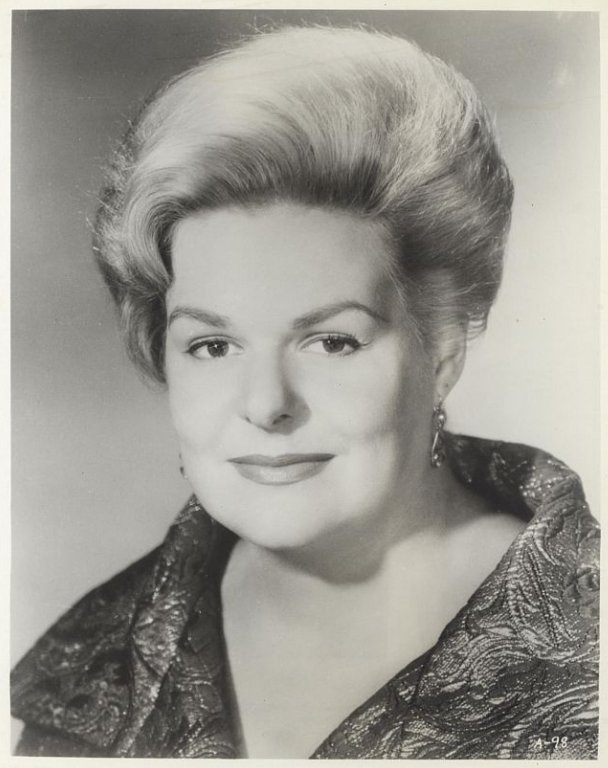

| Maureen Forrester, CC, OQ (born
July 25, 1930, died June 16, 2010) was a Canadian operatic contralto. She
was born as Maureen Kathleen Stewart Forrester in Montreal, Quebec as one
of four children to Thomas Forrester and May Arnold, and grew up in a poor
section of east Montreal. At age 13, she dropped out of school to help support
the family, working as a secretary at Bell Telephone. She was able to pay
for voice lessons with Sally Martin, Frank Rowe, and baritone Bernard Diamant.
She gave her debut recital at the local YWCA in 1953. Her accompanist was
John Newmark, and this was the start of a life-long collaboration. She made
her concert debut in Beethoven's Ninth Symphony with the Montreal Symphony
Orchestra under Otto Klemperer. She toured extensively in Canada and Europe
with Jeunesses Musicales. She made her New York debut in Town Hall in 1956.
Bruno Walter invited her to sing for him; he was looking for the right contralto
for a performance and recording of the Mahler Symphony No. 2 -"Resurrection"
This was the start of a warm relationship with great rapport. Walter had
been a student of Mahler, and he trained Forrester in interpretation of
his works. She performed at Walter's farewell performances with the New York
Philharmonic in 1957. Forrester became known for her performances of Mahler
and for her great stamina, often giving up to 120 performances a year while
raising the five children she had with her longtime husband the conductor
Eugene Kash. She was considered to have superb German diction and great dramatic
sense, which made her a highly-regarded performer of Lieder. She also
performed regularly in concert and opera. She sang at the Metropolitan Opera
in New York in 1975 in Das Rheingold, Siegfried, and
Un Ballo in Maschera. Forrester also provided the voice of the
Bianca Castafiore character in the television series The Adventures of
Tintin. She has been a champion of Canadian composers, regularly scheduling
their works in her programs, especially when she toured abroad. From 1983
to 1988 she served as Chair of the Canada Council. In 1986, she published
her memoirs, Out of Character (ISBN 0-7710-3228-5), with the help of
journalist Marci McDonald. |
|
Maureen Forrester
Chicago Symphony Orchestra appearances (subscription concerts at Orchestra
Hall unless otherwise noted)
Chicago Symphony Chorus, Margaret Hillis, director Glen Ellyn Children’s Chorus, Doreen Rao, director 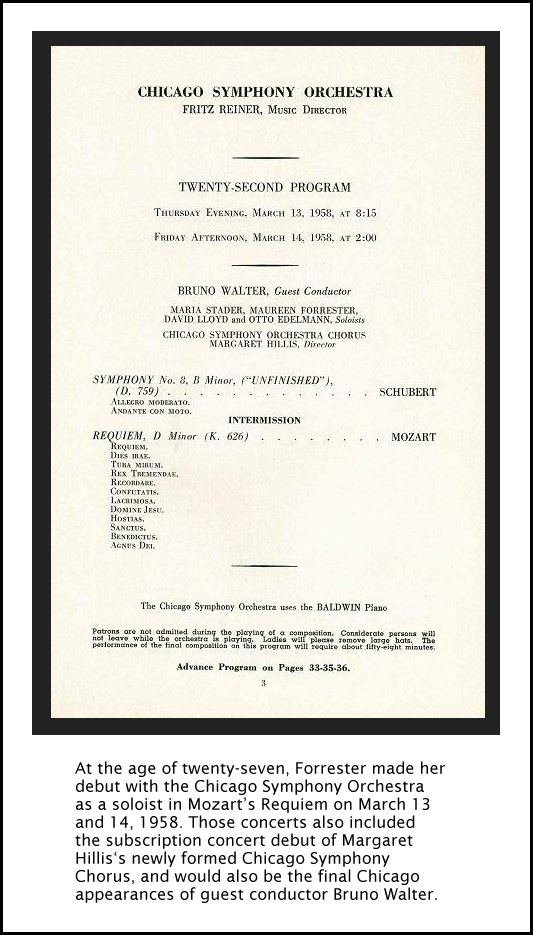 March 13 & 14, 1958
March 13 & 14, 1958Bruno Walter, conductor Maria Stader, soprano Maureen Forrester, contralto David Lloyd, tenor Otto Edelmann, bass November 5 & 6, 1959 MAHLER Das Lied von der Erde (recorded by RCA) Fritz Reiner, conductor Maureen Forrester, contralto Richard Lewis, tenor June 27, 1963 (Ravinia Festival) CASALS El Pessebre Pablo Casals, conductor Olga Iglesias, soprano Maureen Forrester, contralto Paulino Saharrea, tenor Pablo Elvira, baritone William Warfield, bass-baritone Timuel Block, Jr., treble May 7, 8, & 9, 1964 BEETHOVEN Symphony No. 9 Jean Martinon, conductor Ingrid Bjoner, soprano Maureen Forrester, contralto Leopold Simoneau, tenor Heinz Rehfuss, bass-baritone April 7, 8, & 9, 1966 BACH Saint John Passion Jean Martinon, conductor Judith Raskin, soprano Maureen Forrester, contralto Ernst Haefliger, tenor John Boyden, baritone Kenneth Smith, bass-baritone Martha Blackman, viola da gamba Stanley Buetens, lute Edward Mondello, organ Gavin Williamson, harpsichord July 30, 1966 (Ravinia Festival) VERDI Requiem William Steinberg, conductor Saramae Endich, soprano Maureen Forrester, contralto Jacob Barkin, tenor John Macurdy, bass August 2, 1966 (Ravinia Festival) MAHLER Das Lied von der Erde William Steinberg, conductor Maureen Forrester, contralto James King, tenor February 8 & 9, 1968 CHAUSSON Poème de l'amour et de la mer (released on Great Soloists: From the Archives, vol. 10) BRAHMS Rhapsody for Contralto, Male Chorus, and Orchestra, Op. 53 Jean Martinon, conductor Maureen Forrester, contralto July 7, 1973 (Ravinia Festival) MAHLER Symphony No. 3 James Levine, conductor Maureen Forrester, contralto November 13, 14, & 15, 1975 DVOŘÁK Stabat mater Rafael Kubelik, conductor Teresa Gara-Zylis, soprano Maureen Forrester, contralto Eric Tappy, tenor Paul Plishka, bass May 29, 30, & 31, 1980 MAHLER Symphony No. 3 Edo de Waart, conductor Maureen Forrester, contralto November 17, 18, 19, & 22, 1988 MAHLER Symphony No. 2 Zubin Mehta, conductor Marvis Martin, soprano Maureen Forrester, contralto |
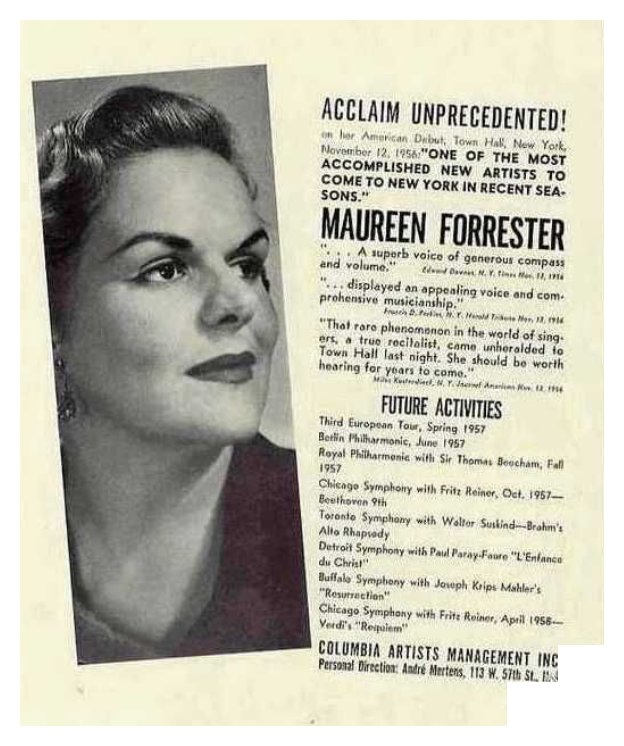 BD: But then how does the student get good experience
rather than bad experience?
BD: But then how does the student get good experience
rather than bad experience?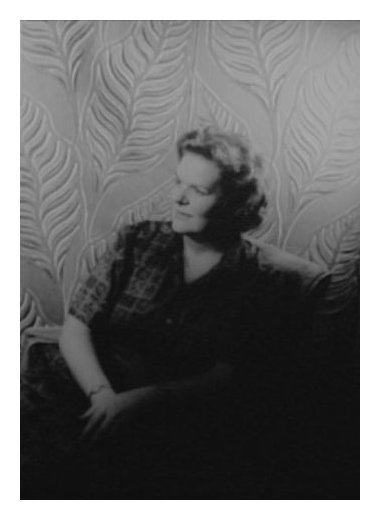 MF: There are lots of roles I can’t sing as well
as everybody else, and I don’t want to do a role like that. I’m not
a Carmen – I’ve never been a Carmen-type. Vocally I could easily have
sung it, and Orpheus I do well. It suits my voice more. There
are roles that are fun to do. I like doing some comic roles I like doing
Quickly, and the Fille du Regiment. I like to play
the piano on the stage and give the singing lesson. I’ve done it with
lots of wonderful sopranos, and that’s fun to play. I wouldn’t want
to have to play twenty-three performances of it though. Three or four
or five or so is enough, I’d say. Musically it’s not as satisfying
as Elektra.
MF: There are lots of roles I can’t sing as well
as everybody else, and I don’t want to do a role like that. I’m not
a Carmen – I’ve never been a Carmen-type. Vocally I could easily have
sung it, and Orpheus I do well. It suits my voice more. There
are roles that are fun to do. I like doing some comic roles I like doing
Quickly, and the Fille du Regiment. I like to play
the piano on the stage and give the singing lesson. I’ve done it with
lots of wonderful sopranos, and that’s fun to play. I wouldn’t want
to have to play twenty-three performances of it though. Three or four
or five or so is enough, I’d say. Musically it’s not as satisfying
as Elektra. 
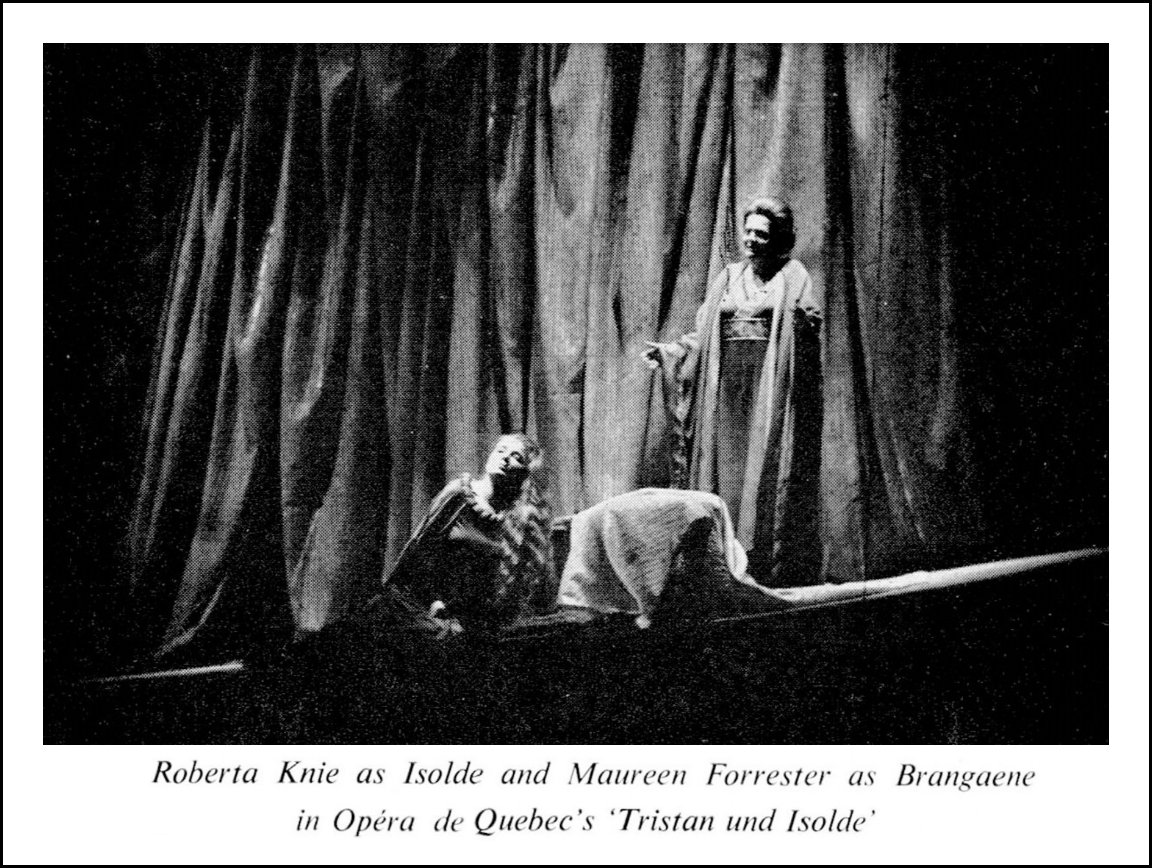
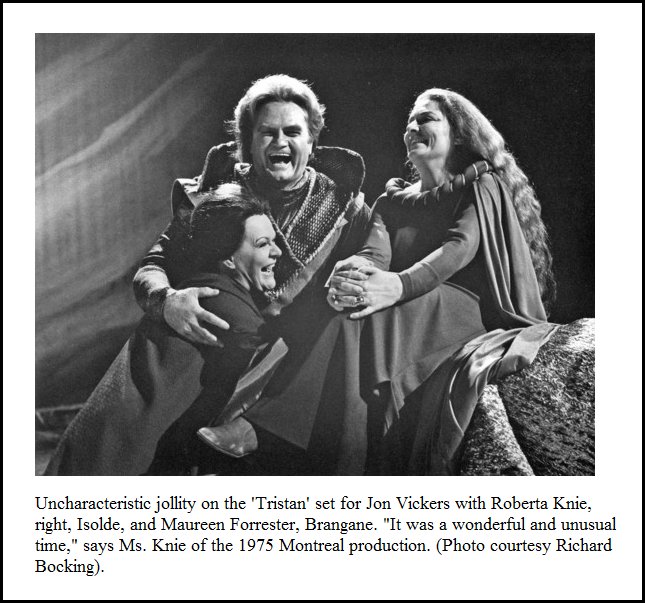 MF: Yes, I do. That was more forward.
It was better, much better.
MF: Yes, I do. That was more forward.
It was better, much better.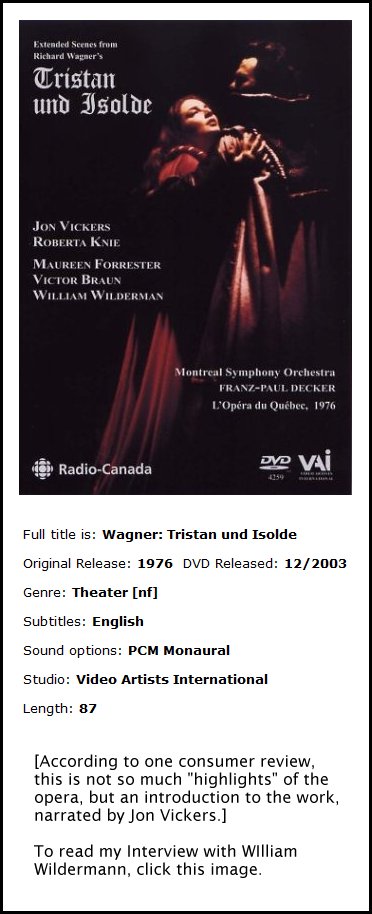 MF: No, no I do them musically. It depends
on if you have a wonderful stage director who gives you incentive, his motivation
for doing this opera. Sometimes you don’t agree, but you do it that
way and it comes off better. Your own concept might not be that way,
but if you grumble about it and then do it your own way, then it disturbs
the opera. The stage director has a visual concept and dramatically
knows what he wants, and somebody sticks out like sore thumb, it’s distracting.
It changes the whole plot line. In Pique Dame, the part I like is when she’s
dying. I remember Kaslik, the Czech director, when we were doing it
in Montreal. He said, “When you’ve just undressed
and you’re in your night gown, and the maids have said that she’s a crotchety
old dame, I want you to let the audience know immediately that you are not
very well. You are old.” She is 89, I think,
but you are old and you are not well, and it’s in this drafty castle.
Then I remembered my father dying. My father had pulmonary edema, and
I took him out of the hospital and we looked after him. I knew he was
dying, but he was a very shy man. When I saw him in the hospital always
facing the wall, I realized he was so shy to see people, having anybody see
him in a gown in the hospital. So we brought him home. We had
oxygen for him. I don’t know if you have ever heard anybody who is dying,
but the heart drowns in the fluid of the lungs. So he goes [imitates
gasping]. Well, I do that on the stage. I do it softly but I can
feel the whole audience sitting up and thinking, “That
woman’s not well.” It was a simple little suggestion
of a very fine director who let you go into your memory and pull out what
is needed.
MF: No, no I do them musically. It depends
on if you have a wonderful stage director who gives you incentive, his motivation
for doing this opera. Sometimes you don’t agree, but you do it that
way and it comes off better. Your own concept might not be that way,
but if you grumble about it and then do it your own way, then it disturbs
the opera. The stage director has a visual concept and dramatically
knows what he wants, and somebody sticks out like sore thumb, it’s distracting.
It changes the whole plot line. In Pique Dame, the part I like is when she’s
dying. I remember Kaslik, the Czech director, when we were doing it
in Montreal. He said, “When you’ve just undressed
and you’re in your night gown, and the maids have said that she’s a crotchety
old dame, I want you to let the audience know immediately that you are not
very well. You are old.” She is 89, I think,
but you are old and you are not well, and it’s in this drafty castle.
Then I remembered my father dying. My father had pulmonary edema, and
I took him out of the hospital and we looked after him. I knew he was
dying, but he was a very shy man. When I saw him in the hospital always
facing the wall, I realized he was so shy to see people, having anybody see
him in a gown in the hospital. So we brought him home. We had
oxygen for him. I don’t know if you have ever heard anybody who is dying,
but the heart drowns in the fluid of the lungs. So he goes [imitates
gasping]. Well, I do that on the stage. I do it softly but I can
feel the whole audience sitting up and thinking, “That
woman’s not well.” It was a simple little suggestion
of a very fine director who let you go into your memory and pull out what
is needed.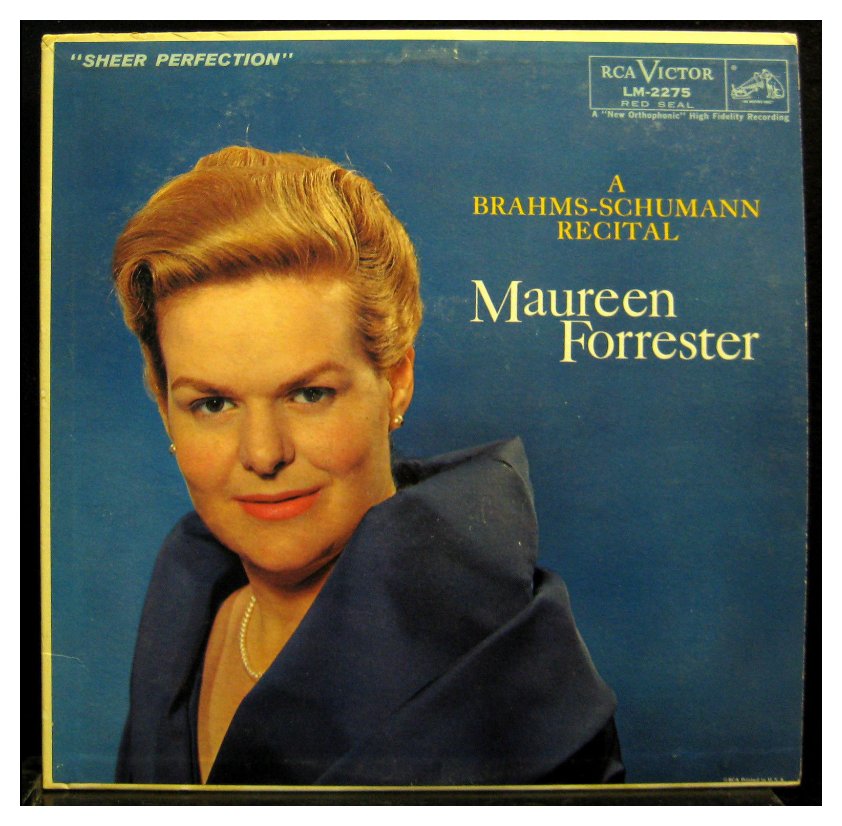
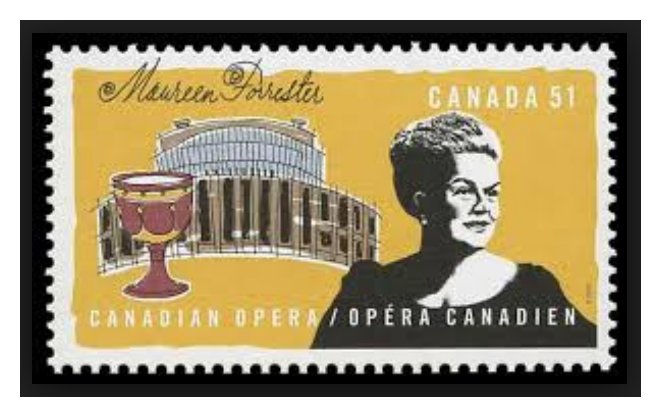 MF: Oh yes, oh, yes! You have to have government
subsidy. It’s absolutely necessary. You would want people to
be proud of what they’re producing. You’ve got to give it a chance to
get from A to B, let alone to Z at the end. I feel there are people
that go after grants even when they’re self-sufficient, and they shouldn’t
because the younger generation needs it. But even a senior artist who
is well known may want to take a year off to do an enormous sculpture.
So he applies for a sustaining grant, and he gets it. It’s wonderful
to be able to do that, or for an instrument maker to do a little trip to the
west coast to choose the wood because it’s only in the west coast that they
have wood wide enough to do the belly of a double bass. It has to be
one piece. So it’s wonderful. It’s very enlightening for me to
see how the money is allocated. It’s all done by a peers system.
Singers are assisted by singers, and so on.
MF: Oh yes, oh, yes! You have to have government
subsidy. It’s absolutely necessary. You would want people to
be proud of what they’re producing. You’ve got to give it a chance to
get from A to B, let alone to Z at the end. I feel there are people
that go after grants even when they’re self-sufficient, and they shouldn’t
because the younger generation needs it. But even a senior artist who
is well known may want to take a year off to do an enormous sculpture.
So he applies for a sustaining grant, and he gets it. It’s wonderful
to be able to do that, or for an instrument maker to do a little trip to the
west coast to choose the wood because it’s only in the west coast that they
have wood wide enough to do the belly of a double bass. It has to be
one piece. So it’s wonderful. It’s very enlightening for me to
see how the money is allocated. It’s all done by a peers system.
Singers are assisted by singers, and so on.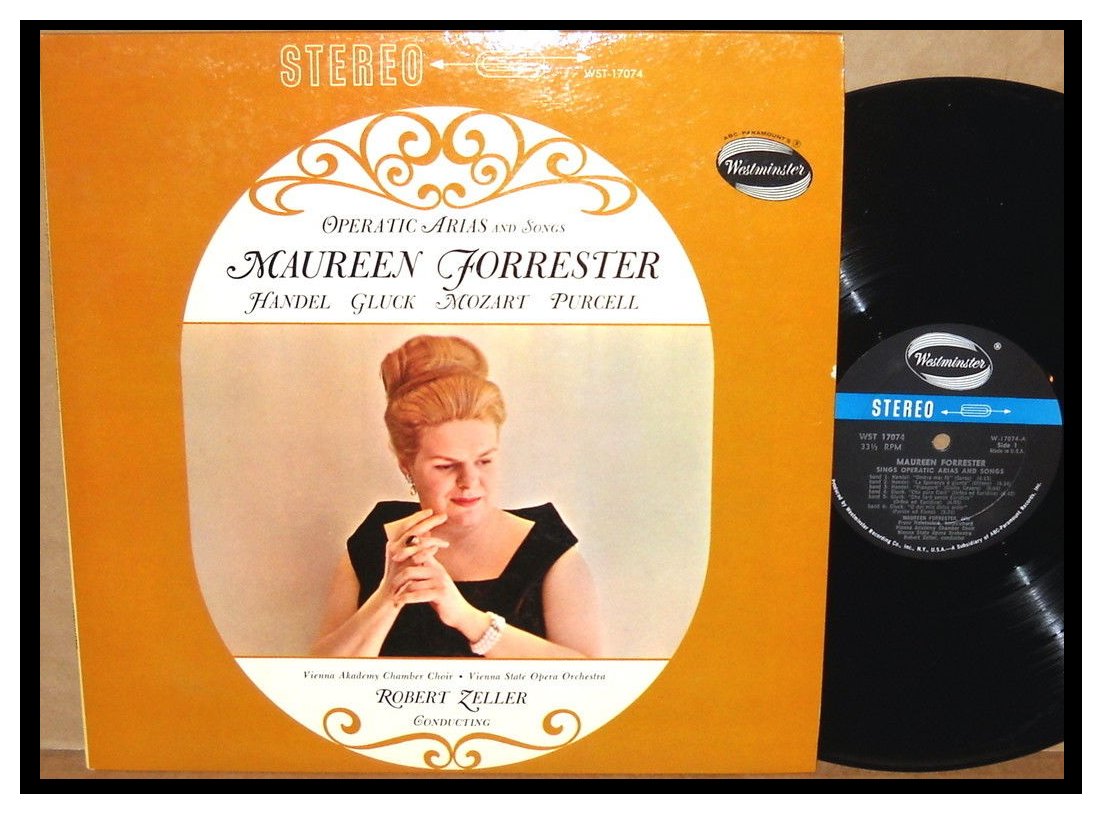
© 1988 Bruce Duffie
This conversation was recorded at her hotel in Chicago on November 21, 1988. Portions were broadcast on WNIB the following year, and again in 1990, 1992, 1995 and 2000. This transcription was made in 2014, and posted on this website at that time. My thanks to British soprano Una Barry for her help in preparing this website presentation.
To see a full list (with links) of interviews which have been transcribed and posted on this website, click here.
Award - winning broadcaster Bruce Duffie was with WNIB, Classical 97 in Chicago from 1975 until its final moment as a classical station in February of 2001. His interviews have also appeared in various magazines and journals since 1980, and he now continues his broadcast series on WNUR-FM, as well as on Contemporary Classical Internet Radio.
You are invited to visit his website for more information about his work, including selected transcripts of other interviews, plus a full list of his guests. He would also like to call your attention to the photos and information about his grandfather, who was a pioneer in the automotive field more than a century ago. You may also send him E-Mail with comments, questions and suggestions.